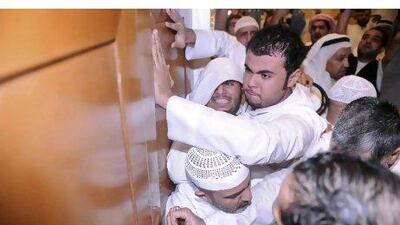KUWAIT CITY // Several hundred anti-government protesters gathered in front of parliament before evening prayers last night, in the first major rally in the country since demonstrators stormed the parliament building last week.
The crowd turned out in the rain despite the emir having reaffirmed his support for the prime minister, whom the protesters are demanding step down. The emir also ordered security forces to take "all necessary measures" to maintain order.
At a similar gathering last week, hundreds of Kuwaitis clashed with police and broke into the main hall of the National Assembly.
"The parliament break-in wasn't a mistake because it's the people's house," Raheel Al Shammari, an activist for the opposition political group the Popular Action Bloc, said last night.
Another participant, Mohammed Ahmed, said the government was "absolutely stupid" to threaten MPs and their supporters with legal action for storming the parliament.
"People are in the street" because they are protesting against government corruption "and the treatment for this situation is to find out why those people were there in the first place," he said.
A second rally for government supporters that was to be held at the same venue last night was reportedly delayed until today.
The emir, Sheikh Sabah Al Ahmed Al Jaber Al Sabah, has said he has no intention of dissolving the parliament or sacking the prime minister in response to the events of what is being called "Black Wednesday".
"Constitutionally, those are my powers. I appoint and I sack. Even if he tenders his resignation, I will not accept it," Sheikh Sabah said on Sunday during a meeting with the editors of local newspapers, according to a transcript published in Al Wasat newspaper.
For the past seven governments, the emir has appointed his nephew, Sheikh Nasser Mohammed Al Sabah to the office of prime minister. The premier chooses the executive branch leaders and citizens select the assembly's 50 parliamentarians. "Dissolving the parliament and the government - these are my powers," the emir said.
Protests against the prime minister have been held regularly in Kuwait before the Arab Spring, but they gained momentum after reports surfaced this summer that multimillion dinar deposits had been placed into bank accounts of MPs close to the government.
Last Wednesday's rally was held after the assembly enraged the opposition by voting against a request to question Sheikh Nasser over the deposits. The opposition claims the move was unconstitutional. Government opponents want the prime minister to face another questioning on November 29.
"We are the ones who protect the constitution and they distort it," said the emir, adding that 40 people had been referred to the prosecutor for forcing their way into the assembly, where they sang the national anthem before being forced to leave. "Storming in and breaking the doors to get into the assembly of which they are members and taking in 150 people - that's what I call a black day," he said.
The MP Musallam Al Barak, one of those who stormed the parliament, said this week he takes full responsibility for guiding the youth activists into the building and urged those who face police interrogation to blame him and the other MPs.
On Saturday, a ministry of interior statement said the square in front of parliament was open for everyone to express their view, but rallies without permits were not allowed for security reasons. The same day the minister of the interior, Sheikh Ahmed Humoud Al Sabah, denied reports that citizens of other Gulf countries had taken part in the siege. He said Kuwait ensures the freedom of speech and democracy within "appropriate legal boundaries".
* With additional reporting by Reuters

